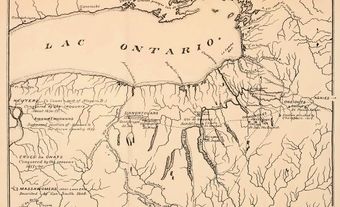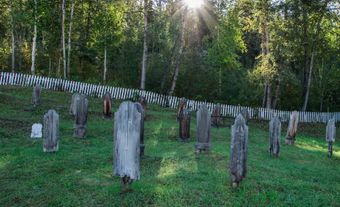Holiness Churches
Holiness Churches, a loose family of some 20 Protestant denominations in Canada that are in general biblically conservative if not fundamentalist, Arminian in theology (ie, rejecting CALVINIST predestination and holding out hope of salvation for all), and advocates of austerity and discipline in lifestyle. The term "holiness" derives from a commitment to the individual pursuit of "Christian perfection," also termed "second blessing," "sanctification" or "holiness." This state, whether achieved instantaneously or gradually, comes through the action of God's Spirit following EVANGELICAL conversion. A variety of sources in METHODISM, German pietism and American revivalism help explain a number of secondary differences in belief and practice.
Holiness was a central concern of early Methodism in both Britain and the US; and some groups (SALVATION ARMY, Free Methodists and Wesleyan Methodists) stem from schismatic Methodist attempts to recover elements of this tradition. Other bodies originated in revival movements among German-speaking settlers in Pennsylvania. Thus the practices of foot-washing and adult baptism by immersion, as well as a tradition of Christian PACIFISM, reflect MENNONITE, Tunker or Baptist roots of groups such as Brethren in Christ and Church of God.
The Holiness Revival
The Holiness revival of the latter half of the 19th century - which gave rise to several groups, notably the Church of the Nazarene - influenced all holiness groups to some degree. Camp meetings and manifestations of religious fervour characteristic of them found renewed vigour when these were falling into disrepute in mainstream Methodism. Like other evangelicals of the period, holiness churches founded BIBLE SCHOOLS that inculcated denominational tradition along with secondary schooling; they established and supported extensive missionary endeavours outside Canada; a number joined in the evangelical crusade for Sunday observance and PROHIBITION. The authority of individual religious experience prompted a larger leadership role for women, and a few of the churches were ordaining women ministers by the beginning of this century.
Modern PENTECOSTALISM originated in American holiness circles about 1900; the ensuing controversy over the Pentecostals' belief in a further blessing, "baptism of the Holy Spirit," brought schism in several bodies. This history, as much as theological divergence, explains a continuing holiness reticence towards neo-Pentecostalism, despite obvious similarities in the 2 traditions. Worship in all groups has emphasized the exposition of the Bible; with congregational participation encouraged in singing, exhortation ("testimonies") and free prayer.
History in Canada
Historically, holiness groups were concentrated in southwestern and eastern Ontario and the Prairie provinces; recent statistics confirm this pattern, although churches are found in all regions of Canada. The movement has been traditionally prone to schism. The period since WWII, however, has seen numerous unions. The 1991 census showed that denominations range in size from the Salvation Army (c 112 345 adult members), the Church of the Nazarene (c 14 950) and the Free Methodist Church (c 14 720) to groups with a membership of a few hundred. As with other evangelicals, these statistics would be considerably augmented by the inclusion of active adherents.
Educational institutions have undergone upgrading, in keeping with a trend towards a more learned ministry. Distinctive standards of dress and deportment have been significantly attenuated. Holiness teaching now tends to emphasize the concept of growth toward sanctification, at the expense of the notion of instantaneous acquisition. A significant element within several denominations (in particular the Missionary Church and the Christian and Missionary Alliance) would question the validity of their classification today as holiness, despite their origins and earlier history.
Significant Members
The following are the most significant members of this family in Canada. Groups German-speaking in origin include BRETHREN IN CHRIST, formerly Tunkers or River Brethren, who entered Canada 1788; the Church of God (Anderson, Indiana); the Evangelical Association or Evangelical Church and the United Brethren in Christ, which united 1946 to form the Evangelical United Brethren. In 1968 the EUB's Ontario section entered the UNITED CHURCH; the Western Conference remained independent as the Evangelical Church in Canada and, after its 1982 merger with the Evangelical Church of North America, became known as the Evangelical Church.
Two Ontario Methodist ministers, Nelson Burns and Ralph Cecil HORNER, actively promoted holiness within their denomination through the organization of autonomous Holiness Associations before their deposition from the Methodist ministry (1894 and 1895 respectively). Through Horner's subsequent work 4 uniquely Canadian bodies came into existence: the Holiness Movement Church (1897); the Standard Church of America (the result of a 1916 schism in the HMC); the Gospel Workers Church, founded about 1902 by Frank Delaney Goff, a Horner convert; and the Bible Holiness Movement (1949). Among bodies of American origin, the Free Methodist Church and the Church of the Nazarene have enjoyed considerable success since their entry into Canada (1880 and 1908 respectively). In 1958 the Holiness Movement Church merged with the Free Methodist Church. That year most of the Gospel Workers joined the Church of the Nazarene.
Unlike all the foregoing, the Reformed Baptist Alliance, the result in 1888 of holiness schism within the Free Baptist Church, was centered primarily in NB and NS. In 1966 it united with the Wesleyan Methodist Church of America; in 1968 these were joined by the Pilgrim Holiness Church to form the Wesleyan Church. Since 1943 most holiness denominations have been loosely associated in the Canadian Holiness Federation and at present most are ecumenically committed through membership in the EVANGELICAL FELLOWSHIP OF CANADA. The Free Methodist and the Wesleyan churches are also members of the World Methodist Council.

 Share on Facebook
Share on Facebook Share on X
Share on X Share by Email
Share by Email Share on Google Classroom
Share on Google Classroom


